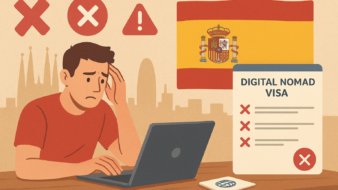Получите Стартап ВНЖ Испании на 3 года
Подходит для тех кто хочет сэкономить на налогах!
Подробнее
Получить бесплатную консультацию
от 60 евро в месяц
Минимальная налоговая нагрузка
От 3 месяцев
Срок получения ВНЖ
5 лет
До постоянного ВНЖ


 28/07/2025
28/07/2025
 Время чтения: 4 мин
Время чтения: 4 мин
Стартап виза в Испанию: полное руководство
В 2025 году испанская стартап-виза – один из самых простых способов для предпринимателей открыть бизнес в Европе. Она предоставляет вид на жительство на три года с возможностью продления на два года. Заявитель вправе переехать с семьей, заниматься трудовой деятельностью и развивать инновационный проект. Рассмотрение заявки занимает от 10 до 30 дней, что обеспечивает оперативность процедуры.
Мы подробно объясним, как получить визу, подготовить документы и успешно запустить стартап в Испании, избегая ошибок.
Всего за 100 евро мы предоставляем цифровую подпись и сопровождаем на каждом шагу подачи. Рассмотрение занимает 10–30 дней. Консульская виза действует 1 год, затем конвертируется в 2-летний ВНЖ. При подаче из Испании вы получите ВНЖ сразу на 3 года.
После одобрения оформите карточку TIE в Испании. Она подтверждает ваш статус резидента и нужна для путешествий по Шенгену. Рекомендуем прочитать нашу статью: как получить TIE.
Вернуться к блогу
Что такое Стартап-ВНЖ
Стартап-ВНЖ Испании в 2025 году — это вид на жительство для предпринимателей с новаторскими проектами. Он предоставляет право жить в Испании на три года с продлением на два года. Проект допускается на стадии концепции, готовый продукт не требуется. ВНЖ сохраняется до окончания срока, даже если бизнес не развивается. Испания стимулирует стартапы налоговыми льготами, грантами и доступом к инвестициям. Законодательство 2013 и 2022 годов упростило процесс получения визы, по которой по приезде в Испании можно получить стартап-ВНЖ. Программа способствует экономическому развитию через инновации и создание рабочих мест. Семья заявителя получает вид на жительство и право на работу. Виза подходит для переезда в Испанию и реализации бизнес-проектов в надежной юрисдикции.Кому подходит стартап-виза Испании
Стартап-виза привлекает предпринимателей, стремящихся основать компанию в Испании. Разрешено развивать местный бизнес или международный проект с регистрацией в Испании. Самозанятые профессионалы с доходом от удаленной работы выбирают эту визу, если не соответствуют критериям визы цифрового кочевника. Программа подходит лицам, планирующим долгосрочное пребывание в Европе. Виза предоставляет период для адаптации и стратегического планирования. Основные участники стартапа могут оформить ВНЖ как высококвалифицированные специалисты. Это увеличивает возможности команды и делает визу универсальным инструментом.Преимущества Испании и испанской стартап-визы
Стартап-виза обеспечивает вид на жительство на 3 года с продлением на 2 года. Супруг и несовершеннолетние дети получают право на работу. Заявку рассматривают за 10–30 дней, что быстрее иных виз. Уровень одобрений высок, хотя точной статистики нет. Испания предлагает низкие расходы на рабочую силу и транспорт. Европейский рынок облегчает торговлю и экспорт. Стартапы поддерживают льготные налоги, гранты и венчурные инвестиции. Отчет о прогрессе проекта не требуется, ВНЖ сохраняется при неудаче. Испания — центр инноваций с высоким уровнем жизни, мягким климатом и развитой инфраструктурой.Требования для получения стартап-ВНЖ
Ваш проект должен быть инновационным и полезным для экономики Испании. Бизнес-план должен создавать рабочие места или приносить технологическую ценность. Организация ENISA оценивает план, проверяя его уникальность и потенциал. Дополнительные условия, которые нужно выполнить, чтобы подать заявку на стартап-визу в Испанию:- Выписка из банка с подтверждением суммы на счете заявителя на визу не менее €28 800 (400% IPREM за год).
- Справка о несудимости с апостилем за последние 5 лет.
- Медицинская страховка sin carencias y copagos.
- Паспорт, действительный минимум год.
Необходимые документы для подачи заявки
Полный пакет документов — залог успешной подачи на стартап-визу. Ошибки или нехватка бумаг приводят к отказу. Все справки переводят на испанский и заверяют, а сроки действия проверяют заранее. Основные документы: бизнес-план, одобренный ENISA, заполненная анкета, скан паспорта с пустыми страницами, фото 4х3 для TIE. Подтверждайте финансы выпиской о 28 800 евро для заявителя и 7200 евро на каждого члена семьи. Справка о несудимости нужна из стран проживания за 5 лет с апостилем. Семья предоставляет свидетельства о браке или рождении детей с апостилем и переводом. Медицинская страховка от испанской компании обязательна. Оплатите пошлину и приложите квитанцию с номером NRC. Убедитесь, что выписка из банка не из России или Беларуси. Полный пакет документов для стартап-визы в Испанию в 2025 году:| Документ | Описание |
|---|---|
| Бизнес-план | Инновационный проект, одобренный ENISA |
| Анкета | Официальная форма для UGE или консульства |
| Паспорт | Скан всех страниц, действующий минимум год |
| Фото | Формат 4х3, для карточки TIE |
| Страховка | Нужна частная медицинская страховка от испанской компании |
| Обещание встать на учет в соцстрах | Заполненная и подписанная анкета |
| Документ о несудимости | Справка об отсутствии судимости с апостилем |
| Пошлина | Оплата пошлины 730-038 |
Процесс подачи заявки: пошаговая инструкция
Подача на стартап-визу требует тщательной подготовки. Вы можете подать заявку из Испании через платформу UGE или через консульство за границей. Пошаговый план подготовки документов для заявки на испанскую стартап-визу в 2025 году включает:| Шаг | Описание |
|---|---|
| Шаг 1. Составление бизнес-плана и подача его на рассмотрение в ENISA | Описание плана представляет собой презентацию в свободной форме проекта и его основных характеристик, презентацию команды, исследование рынка, описание экономической пользы. |
| Шаг 2. Сбор необходимых документов, перечисленных в таблице выше этой статьи | Все собранные документы должны быть переведены присяжным переводом на испанский и заверены нотариусом. |
| Шаг 3. Подача заявки на стартап-визу в Испанию | Загрузите заявку на UGE с цифровой подписью или подайте в консульство. |
Финансовые аспекты и дополнительные расходы
Стартап-виза требует финансовых вложений на этапе подачи. Предварительные затраты составят:- Медицинская страховка от испанской компании — 500–1000 евро в год на человека. Вы можете оплачивать ее помесячно, а при отказе отменить без потерь.
- Пошлина — 75 евро на каждого члена семьи, оплачивается в испанском банке.
- Перевод документов — рассчитывается отдельно и зависит от количества слов в документе.
- Апостиль — около 25 евро за документ.
Жизнь в Испании для предпринимателей
Испания привлекает бизнесменов средиземноморским климатом, богатой культурой и развитой инфраструктурой. Барселона и Мадрид — ведущие центры для стартапов с активным нетворкингом и доступом к инвесторам. Качество жизни в Испании высокое, что делает релокацию комфортной для всей семьи. Единый рынок Европы открывает доступ к 450 миллионам потребителей без валютных рисков. Льготные налоги и гранты от ENISA и других фондов поддерживают развитие бизнеса. Семья легко адаптируется: дети посещают международные школы, а испанский язык изучают на курсах. Предприниматели пользуются коворкингами, акселераторами и стартап-мероприятиями для роста проектов.Истории релокации наших стартаперов
Возможные трудности и как их избежать
Неполный пакет документов — самая частая причина отказов. Слабый бизнес-план, не соответствующий критериям ENISA, отклоняют. Недостаток финансов (менее 28 800 евро) или просроченные справки тоже могут послужить основаниями для отказа. ENISA строго оценивает инновационность и экономическую пользу проекта. Тщательно проверяйте переводы, апостили и сроки действия документов. Убедитесь, что выписка из банка подтверждает требуемую сумму, а сам банк — не российский или белорусский. При отказе подавайте апелляцию в течение 1 месяца, уточнив причины. Соберите недостающие документы. Повторная подача возможна после исправлений. Обратитесь за консультацией, чтобы минимизировать риски.Полезные ресурсы и ссылки
- Сайт консульства Испании публикует актуальные требования для визы.
- ENISA объясняет критерии оценки бизнес-планов.
- Платформа UGE упрощает онлайн-подачу.
Часто задаваемые вопросы
Подать в консульство Испании одобренный ENISA бизнес-план, справку из банка (не российского и не белорусского) о наличии не менее €28 800 (+7200 евро на каждого члена семьи), анкету MI-T, скан всех страниц паспорта, действующего как минимум год, фото 4х3, страховку sin carencias y copagos, письменное обещание встать на учет в соцстрах, заполненную и подписанную анкету, справку о несудимости с апостилем из всех стран, где проживали последние 5 лет, квитанцию об уплате пошлины 730-038 и присяжные переводы всех этих документов.
С апреля 2024 года, согласно вступившему в силу Ley 28/2022, обладатели стартап-ВНЖ могут вообще не проживать в Испании.
Помимо туристической Шенгенской визы для въезда и долгосрочного пребывания в Испании можно получить визу цифрового кочевника (Digital Nomad Visa), стартап-визу Испании, студенческую визу Испании, рабочую визу, ВНЖ без права на работу (no lucrativa), по воссоединению семьи (заключение брака).










